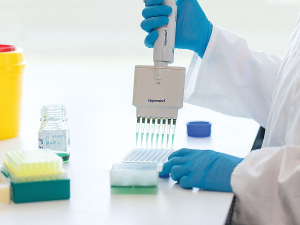LIC lifts half-year revenue on strong demand for dairy genetics
Herd improvement company LIC has posted a 5.2% lift in half-year revenue, thanks to increasing demand for genetics.
 The technology used to detect Covid-19 in wastewater is now being used to help dairy farmers manage Johne’s disease in their herd.
The technology used to detect Covid-19 in wastewater is now being used to help dairy farmers manage Johne’s disease in their herd.
The technology used to detect Covid-19 in wastewater is now being used to help dairy farmers manage Johne’s disease in their herd.
Johne’s disease is caused by a bacterium which infects the gut of dairy cows and other ruminant animals. Common side effects include lower milk production, difficulty reproducing and rapid weight loss.
Herd improvement co-operative LIC has developed a new test which detects whether the bacteria responsible for Johne’s disease is present in a farm’s effluent wastewater.
The test is a New Zealand-first for farmers, to help them detect the disease and prevent the spread of it on their farm, protecting the health and wellbeing of their animals.
LIC chief scientist Richard Spelman says, similar to Covid-19 wastewater testing, this test is a surveillance measure.
“We developed this test because Johne’s disease is common in dairy cows but it can be difficult to detect. Infected animals often don’t show physical symptoms of the disease, meanwhile their milk production can drop and they spread the infection to others.
“This new test provides farmers with a cost-effective way to screen their herd for Johne’s disease and use this information to determine whether individual animal testing is required,” Spelman says.
He says it’s important for farmers to have a range of tools available to help produce the most sustainable, productive and efficient animals, and the new effluent test is another tool they can add to their toolbox.
The test comprises of four samples taken from different areas of the farm’s effluent system.
Similar to Covid testing where RNA is extracted from wastewater sites and analysed by Polymerase Chain Reaction (PCR), the LIC test extracts DNA from the effluent samples, which are analysed by scientists using the same type of PCR test.
Each effluent sample receives a ‘detected’ or ‘not detected’ result.
“If Johne’s disease bacteria is detected in a sample, we encourage farmers to get each of their cows tested using blood or herd test milk samples to identify carriers of the disease,” says Spelman.
If there is no sign of the bacteria on-farm in the initial effluent test, LIC’s research shows the herd is likely to either be currently disease free, or low in disease prevalence.
Annual testing is recommended so farmers can identify if or when animals start shedding Johne’s bacteria into the effluent system.
Spelman says now is an optimal time for most farmers to consider using the effluent test.
“For spring calving farmers, it’s best to test from September to December to help ensure the entire herd is captured in the effluent samples.”
Global dairy prices are on a roll, recording a fourth consecutive jump on the Global Dairy Trade (GDT) auction this year.
Booming primary sector exports are helping lift earnings for farm service providers.
The world is waking up to the disadvantages of carpets derived from petrochemicals, creating opportunities for New Zealand strong wool.
The red meat sector finds itself in "a very rare set of circumstances", says Federated Farmers meat and wool industry chair Richard Dawkins.
Agrisea NZ has appointed Craig Hudson as it's new chief growth officer.
State farmer Landcorp, trading as Pamu, is a forecasting a full-year net profit of around $100 million.
OPINION: Staying with politics, with less than nine months to go before the general elections, there’s confusion in the Labour…
OPINION: Winston Peters' tirade against the free trade deal stitched with India may not be all political posturing by the…